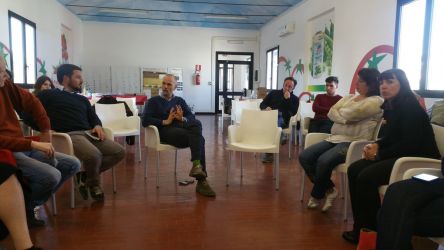What are the best strategies for crop diversification in response to climate change? And what are the innovations in agronomic management in an environmental context altered by the climate? This was discussed today at the first Regional Meeting of the DIVERFARMING project, which took place at the Ferrari company (Gariga plant, Piacenza), one of the case studies where the rotation of leguminous crops - durum wheat - tomatoes is tested and fertilization by anaerobic digestate (a natural fertilizer derived from biogas production). These are techniques used to increase soil carbon sequestration, thereby improving fertility and microbial biodiversity, as well as reducing greenhouse gas emissions.
 Today, which will be followed by two more (in Mantua and Cremona), was an opportunity for listening and discussion with farmers, producers and representatives of local administrations, who were able to experience the advantages of the methods of crop diversification. The field visit was followed by a "fishbowl" (literally "the fish tank", a moment of discussion between participants and speakers) in which we tried to identify the best strategies to mitigate environmental impacts. Among these, a diversified role is played by the diversified agronomic approaches alternative to monoculture, such as crop rotation (temporal rotation of different crops), intercropping (ie the possibility of introducing inter-crop cultures between different main crops) and multicropping, or multicolour cultivation (the coexistence of different crops in the same area).
Today, which will be followed by two more (in Mantua and Cremona), was an opportunity for listening and discussion with farmers, producers and representatives of local administrations, who were able to experience the advantages of the methods of crop diversification. The field visit was followed by a "fishbowl" (literally "the fish tank", a moment of discussion between participants and speakers) in which we tried to identify the best strategies to mitigate environmental impacts. Among these, a diversified role is played by the diversified agronomic approaches alternative to monoculture, such as crop rotation (temporal rotation of different crops), intercropping (ie the possibility of introducing inter-crop cultures between different main crops) and multicropping, or multicolour cultivation (the coexistence of different crops in the same area).
DIVERFARMING, a five-year European project of which CREA is the contact point for Italy and the North Mediterranean, aims to build diversified crop systems with low chemical inputs, able to guarantee crop yields and reduce environmental impacts, trying to offer, then , a possible solution to agro-climatic problems. The CREA, with its centers of Agriculture and Environment, Cereal Culture and Industrial Crops and Genomics and Bioinformatics, deals specifically with assessing the effects of the techniques adopted in areas with different soil and climatic conditions on the main physical-chemical and biological soil parameters, on microbiodiversity and emissions, identifying, through a forecasting model, the best management in terms of conservation of organic matter, increase in biodiversity, maintenance of soil fertility and resilience of the agro-ecosystem (ie its ability to respond to sudden changes ). The other Italian partners of the project are the University of Tuscia, Barilla and the Consorzio Casalasco ability to respond to sudden changes). The other Italian partners of the project are the University
della Tuscia, Barilla and the Casalasco Consortium.
Diverfarming is a project funded by the European Commission Horizon 2020 Program within the call "Food Security, Sustainable Agriculture and Forestry, Marine, Maritime and Inland Water Research and the Bioeconomy", which relies on the participation of the Universities of Cartagena and Córdoba (Spain), of Tuscia (Italy), of Exeter and Portsmouth (United Kingdom), of Wageningen (Netherlands), of Trier (Germany), of Pecs (Hungary) and of ETH Zurich (Switzerland), the Council for agricultural research and the analysis of the agricultural economy (Italy), the Consejo Superior de Investigaciones Científicas (Spain) and the Natural Resources Institute LUKE (Finland), the ASAJA organization, and the companies Casalasco and Barilla (Italy), Arento, Disfrimur Logística and Industrias David (Spain), Nieuw Bromo Van Tilburg and Ekoboerdeij of Lingehof (Holland), Weingut Dr. Frey (Germany), Nedel-Market KFT and Gere (Hungary) and Paavolan Kotijuustola and Polven Juustola (Finland).










